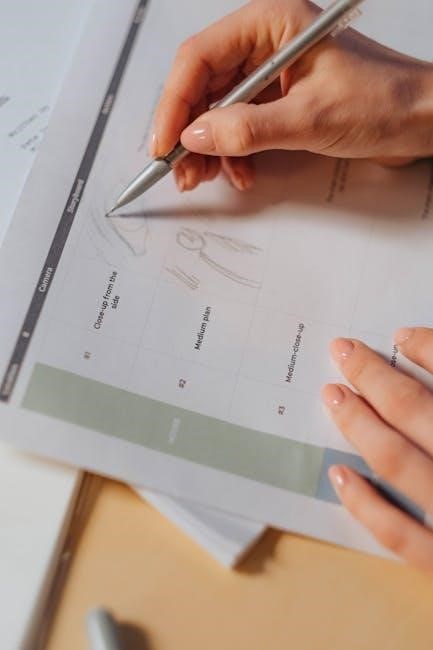The LPN curriculum is designed to equip students with essential nursing skills and knowledge, focusing on patient care across various age groups and settings. It combines theoretical and practical training, ensuring a comprehensive understanding of nursing principles, biological sciences, and clinical practices, while preparing students for certification and real-world challenges.
1.1 Overview of the LPN Program
The LPN program offers a comprehensive learning pathway, blending theoretical knowledge with hands-on training. Designed to prepare students for diverse healthcare settings, the curriculum emphasizes essential nursing skills, patient care, and medical procedures. By balancing classroom instruction with clinical experience, the program ensures students are well-equipped to handle real-world challenges in nursing, fostering both competence and confidence.
1.2 Importance of the LPN Curriculum Guide
The LPN curriculum guide serves as a roadmap for students, outlining course objectives, prerequisites, and program expectations. It ensures clarity in academic progression and skill development, aligning education with industry standards. This guide is essential for students to navigate their training effectively, understand evaluation criteria, and prepare for the NCLEX-PN exam, fostering success in their nursing careers.

Core Courses in the LPN Curriculum
The LPN curriculum includes foundational courses like Biological Science I, Pharmacology, and Nursing Fundamentals, blending theory with hands-on training to prepare students for diverse healthcare roles and real-world scenarios.
2.1 Biological Science I
Biological Science I introduces foundational concepts in anatomy, physiology, and biology, essential for understanding human health and disease. This course emphasizes the structure and function of body systems, preparing LPN students for clinical applications and advanced nursing topics.
2.2 Pharmacology and Medication Administration
Pharmacology and Medication Administration teaches LPN students about drug classifications, dosages, and administration routes. Emphasis is placed on safe medication practices, dosage calculations, and understanding drug interactions. Students learn to monitor patients for side effects and ensure accurate administration, adhering to legal and ethical standards in pharmacological care.
2.3 Nursing Fundamentals and Skills
This course introduces students to essential nursing skills, including patient assessment, vital sign measurement, and infection control. Students master basic care techniques such as bathing, dressing, and mobility assistance. Emphasis is placed on developing professionalism, communication, and cultural competence to provide holistic, patient-centered care in diverse healthcare settings.

Clinical Training and Hands-On Experience
Clinical training bridges classroom learning with real-world patient care, offering hands-on practice in diverse healthcare settings. Students develop critical skills in patient assessment, medication administration, and adaptive nursing techniques.
3.1 Geriatric Nursing Practice
Geriatric nursing focuses on caring for elderly patients, emphasizing age-related health issues like chronic diseases and mobility challenges. Students learn tailored assessment techniques, pain management strategies, and how to promote independence and dignity in older adults, preparing them to address the unique needs of this population effectively in clinical settings.
3.2 Medical-Surgical Nursing
Medical-surgical nursing focuses on caring for adult patients with various medical conditions, including chronic diseases and post-surgical recovery. LPN students learn to administer medications, manage wounds, and monitor vital signs. This course emphasizes hands-on training in clinical settings, preparing students to address common conditions like diabetes, respiratory issues, and cardiovascular diseases, ensuring comprehensive patient care and support.
3.3 Pediatric and Maternal-Child Nursing
Pediatric and maternal-child nursing focuses on the care of infants, children, and mothers. LPN students learn to assess pediatric patients, manage common childhood illnesses, and support maternal health. This course covers developmental milestones, nutrition, and emotional support, preparing students to provide compassionate care in pediatric and obstetric settings, ensuring healthy outcomes for mothers and children.

Specialized Courses and Certifications
Specialized courses and certifications in the LPN curriculum include IV therapy, EKG interpretation, and pharmacology. These enhance clinical skills and prepare students for advanced patient care roles, ensuring they meet industry standards.
4.1 IV Therapy and Certification
IV therapy and certification courses teach LPN students essential skills in venipuncture, fluid administration, and medication delivery. These courses emphasize patient safety, proper technique, and legal standards. Certification prepares LPNs to perform IV therapies confidently, enhancing their clinical competency and career opportunities in healthcare settings. Practical training ensures hands-on experience, equipping students to handle real-world scenarios effectively.
4.2 EKG Course and Interpretation
The EKG course teaches LPN students to interpret electrocardiograms, identifying normal and abnormal heart rhythms. This training enhances their ability to assess cardiovascular health and detect conditions like arrhythmias or ischemia. Practical sessions and case studies prepare LPNs to apply EKG skills in clinical settings, improving patient care and diagnostic accuracy. Certification in EKG interpretation boosts their expertise and employability in healthcare environments.
Program Outcomes and Certification
Upon completing the LPN program, graduates are prepared to take the NCLEX-PN exam, leading to certification. This certification enables them to work in various healthcare settings, providing quality patient care.
5.1 Eligibility for the NCLEX-PN Exam
Graduates of an accredited LPN program are eligible to take the NCLEX-PN exam. Completion of all required courses, clinical training, and meeting the program’s academic standards are mandatory. The program must be approved by the state nursing board or an accrediting agency to ensure eligibility for the licensure exam.
5.2 Career Opportunities for LPNs
LPNs can work in diverse healthcare settings, including hospitals, clinics, and long-term care facilities. They often specialize in geriatric, pediatric, or medical-surgical nursing. With experience, LPNs may pursue advanced roles or further education to become RNs. The demand for skilled LPNs remains high, offering stability and flexibility in career growth within the nursing profession.

Admission Requirements and Prerequisites
Prospective LPN students must meet academic prerequisites, such as completing high school or equivalent, and may need to pass entrance exams like the TEAS. Background checks and immunizations are often required for clinical placement eligibility.
6.1 Academic Prerequisites for Enrollment
Applicants must complete high school or equivalent with a minimum GPA, often requiring courses in biology, chemistry, and mathematics. Prerequisite courses like Biological Science I and Pharmacology may be needed. A minimum GPA of 2.5 or higher is typically required, along with entrance exams such as the TEAS. These academic prerequisites ensure foundational readiness for the LPN program’s demands.
6.2 Additional Requirements for Clinical Placement
Additional requirements for clinical placement include up-to-date immunizations, criminal background checks, and drug screenings. Students must also provide proof of health insurance and current CPR certification. These measures ensure compliance with clinical site regulations and patient safety, preparing students for hands-on experience in real-world healthcare settings.

Curriculum Delivery Formats
LPN programs offer flexible learning options, including full-time, part-time, evening, and weekend classes, accommodating diverse student schedules and preferences for convenient education.
7.1 Full-Time vs. Part-Time Programs
Full-time LPN programs offer an accelerated path, typically completed in 12-18 months, ideal for focused learners. Part-time programs provide flexibility, often taking 24-36 months, suitable for those balancing other commitments. Both formats cover the same curriculum, ensuring comprehensive training, but cater to different student needs and pacing preferences for optimal learning outcomes.
7.2 Evening and Weekend Classes
Evening and weekend classes offer flexibility for working professionals or those with daytime commitments. These programs allow students to balance education with personal and professional responsibilities. The curriculum remains identical to full-time programs, ensuring comprehensive training. Structured schedules accommodate diverse lifestyles, making LPN education accessible to a broader range of learners seeking to advance their nursing careers.

Resources for LPN Students
LPN students benefit from various study guides, nursing notes, and online tools for skill development, aiding both academic and clinical success.
8.1 Study Guides and Nursing Notes
LPN students can access detailed study guides, pharmacology notes, and head-to-toe assessment templates to enhance learning. These resources cover fundamental concepts, medication administration, and clinical skills, ensuring a strong foundation for both theoretical and practical aspects of nursing, ultimately improving patient care delivery and exam preparation.
8.2 Online Tools for Skill Development
Online tools, such as simulation platforms and video tutorials, enhance LPN skill development by providing interactive learning experiences. These resources cover clinical scenarios, medication administration, and hands-on procedures, allowing students to practice and refine their techniques in a virtual environment. Additionally, digital modules and quizzes reinforce theoretical knowledge, ensuring a well-rounded education and better preparedness for real-world patient care.

Assessment and Evaluation
Assessment includes quizzes, exams, and clinical evaluations to ensure student competence. Evaluations focus on theoretical knowledge and practical skills, preparing students for the NCLEX-PN exam and real-world challenges.
9.1 Grading Criteria and Passing Requirements
Grading criteria in the LPN curriculum require students to achieve a minimum of a C grade or higher in all courses. Passing requirements include successful completion of both theoretical and clinical components, with assessments evaluating critical thinking, practical skills, and adherence to safety protocols. Consistent academic performance ensures readiness for the NCLEX-PN exam and professional practice.
9.2 Clinical Competency Assessments
Clinical competency assessments evaluate students’ ability to apply skills in real-world settings, ensuring they can perform tasks like patient care and medication administration safely. These assessments focus on critical thinking, technical proficiency, and adherence to nursing standards. Passing them is essential for advancing in the program and preparing for the NCLEX-PN exam. They are conducted through direct observation and feedback, ensuring students meet industry standards.

Curriculum Design and Standards
The LPN curriculum is designed to meet industry standards, ensuring quality education and preparing students for licensure. Accreditation guarantees adherence to regulatory requirements, fostering competency and excellence in nursing practice.
10.1 Accreditation and Program Approval
Accreditation ensures LPN programs meet rigorous educational standards, guaranteeing quality instruction and clinical training. Approval from recognized accrediting bodies validates the curriculum’s alignment with industry requirements, preparing students for successful licensure and professional practice. This certification also enhances graduate employability and ensures eligibility for the NCLEX-PN exam, a critical step towards becoming a licensed practical nurse.
10.2 Alignment with Industry Standards
The LPN curriculum is carefully designed to align with industry standards, ensuring graduates are well-prepared for real-world healthcare challenges. Courses like Biological Science I and Pharmacology are tailored to meet national guidelines, focusing on essential skills such as patient assessment, medication administration, and medical-surgical nursing. This alignment ensures students gain practical expertise needed for effective patient care in diverse clinical settings.
The LPN curriculum offers a comprehensive pathway to nursing excellence, blending theory and practice to prepare students for successful careers in healthcare, with a focus on patient-centered care.
11.1 Final Thoughts on the LPN Curriculum
The LPN curriculum is a well-structured program that balances theoretical knowledge with hands-on training, ensuring students are fully prepared for the NCLEX-PN exam and diverse patient care settings. It emphasizes critical thinking, practical skills, and ethical practices, equipping graduates to excel in their nursing careers and provide compassionate, high-quality care across various healthcare environments.
11.2 Encouragement for Prospective Students
Embarking on the LPN curriculum is a rewarding journey that opens doors to a fulfilling nursing career. With comprehensive training and hands-on experience, students gain the confidence and skills to make a meaningful impact in healthcare. Prospective students are encouraged to embrace this opportunity, as it offers a blend of challenging yet rewarding experiences that shape compassionate and skilled nursing professionals.